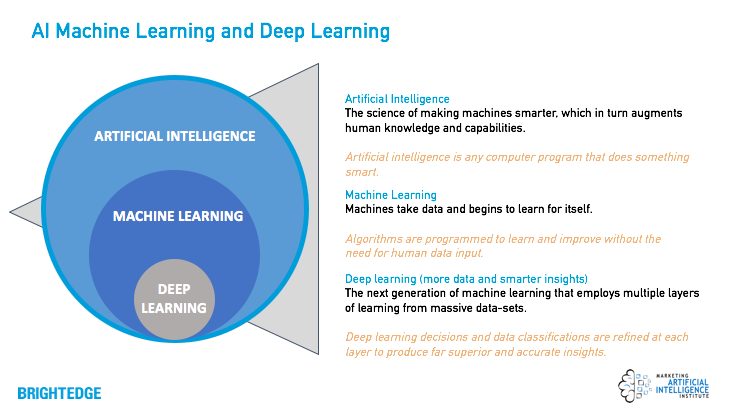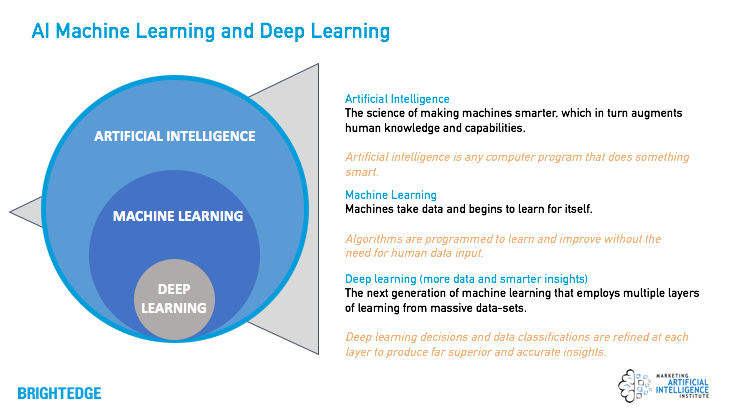We have entered a new era of search where SEO and content marketing have converged.
AI technologies are providing a whole new world of insights so marketers can make impactful – data-informed – decisions. The AI revolution is here and now, and early adopters in SEO and content marketing are already one step ahead of the competition.
Artificial intelligence
While Artificial Intelligence has slowly become a part of everyday lives, growing all around us. It was only when Google introduced RankBrain in 2015 when search marketers started to see the potential use cases for AI and machine learning. As Albert Gouyet wrote in his recent piece, ‘Artificial intelligence and machine learning: What are the opportunities for search marketers?‘:
- Artificial intelligence is the science of making machines do things requiring human intelligence. It is human intelligence in machine format where computer programs develop data-based decisions and perform tasks normally performed by humans.
- Machine learning takes artificial intelligence a step further in the sense that algorithms are programmed to learn and improve without the need for human data input and reprogramming.
Machine learning is all around us and has been part of people’s everyday lives for many years now. The most relevant examples for SEOs are based around voice-enabled technologies that are used in more than 20% of mobile queries.
When people are on their way to work, they use voice search to send messages and navigate via their in-car system. When people are at work, they use voice search on their laptops to manage diaries and schedules. At home, people may use Amazon Echo or Google Home and watch films on Netflix.
The two key AI and machine learning benefits I want to focus today on are centered around:
Insights that are accurate, actionable, and impact revenue
Automation of labour-intensive tasks and programmatic scale.
I: Data-driven insights
Marketing today is very labor-intensive, often requiring marketers to dig through too much data that may not even be giving them the bigger picture they need to make impactful business decisions. More than 80 percent of the world’s data is unstructured–for example, data from text, video, images, and user-generated social and blog content–and marketers need to break this down into structured formats that they can act on.
To do this effectively and in a manner that produces impactful business results, requires planning, process discipline, and advanced technology. By leveraging AI and machine learning systems that leverage both historical and real-time data, SEO and content marketers can map out in advance what types of content will perform best.
Marketers can use these insights in so many ways to blend the best of search marketing and content marketing practices in two key ways.
1. Targeting demand: Discovering new data patterns and industry and competitive trends
Targeting demand requires a deep understanding of your audience and AI-based insights help marketers decide which channels and types of content consumers are searching for. Data-driven insights into consumer demand set marketers up for success with a content marketing strategy built specifically for their target audience.
Intent data offers in-the-moment context on where customers want to go and what they want to know, do, or buy. Organic search data is the critical raw material that helps you discover consumer patterns, new market opportunities, and competitive threats.
2. Personalizing the customer experience: Producing content that resonates, engages and delights customers
This is one of the areas where AI and machine learning can have the biggest impact. Rich (deep) data-led insights can help incorporate content and present people with choices and promotions at the right time based on their past preferences. This is where deep learning can have a massive impact.
Deep learning is the next generation of machine learning where massive data sets are combined with pattern recognition capabilities to automatically make decisions, find patterns, and provide accurate insights that help drive SEO and content marketing strategies.
Deep learning is particularly important in search, where data sets are large and shifts are dynamic. Deep learning allows you to identify patterns and trends in real-time. SEO and content marketers can immediately turn these insights into a plan to win.
A: Machine Learning and Automation
Being armed with smart insights to uncover potential topics that are hyper-relevant to their target audience and automation allows SEO and content marketers to scale their programs and maximize working efficiency.
Speed will be a critical part of getting ahead of others within your market space, and automation will be the foundation of achieving this goal.
Automation allows marketers to:
- Act on recommendations faster
- Get content in front of their audience before the competition
- Ensure that content is optimized from the moment it goes live.
For example, Kraft used a combination of machine learning and insights to optimize their content creation process. Kraft tracked more than 22,000 different audience characteristics then used these insights to inform their content creation process. The result was a 4x increase in ROI from content, when compared to targeted ads.
Automation is helping marketers do more with less and execute more quickly. Routine SEO and content tasks can be implemented with little effort, allowing SEO and content marketers to focus on high-impact activities and accomplish their personal and professional objectives at scale.
Conclusion
AI, machine learning and deep learning is going to transform how SEO and content marketers operate via the utilization of data-driven insights and give marketers the competitive edge to formulate impactful content marketing strategies.
Source: Marketing in the Machine Age
Marketers will use AI to respond to complexity and rapid change that is beyond the normal human capabilities, like the search algorithm changes and evolution of the layout of the SERPs.
AI will improve marketers’ agility–having the flexibility to adapt quickly to changes in the market and change content strategy in line with competitive market trends. This includes having the ability to scale content marketing efforts effectively through entire organizations.
In addition, AI will help marketer capture and satisfy customers by optimizing customer experience and content personalization, issues that present dozens to hundreds to thousands of combinations to satisfy a range of customer personas at different points on the lifecycle.
Providing users with highly relevant, optimized, and engaging content tailored to the customers’ expectations, needs and goals will improve all marketing metrics.

